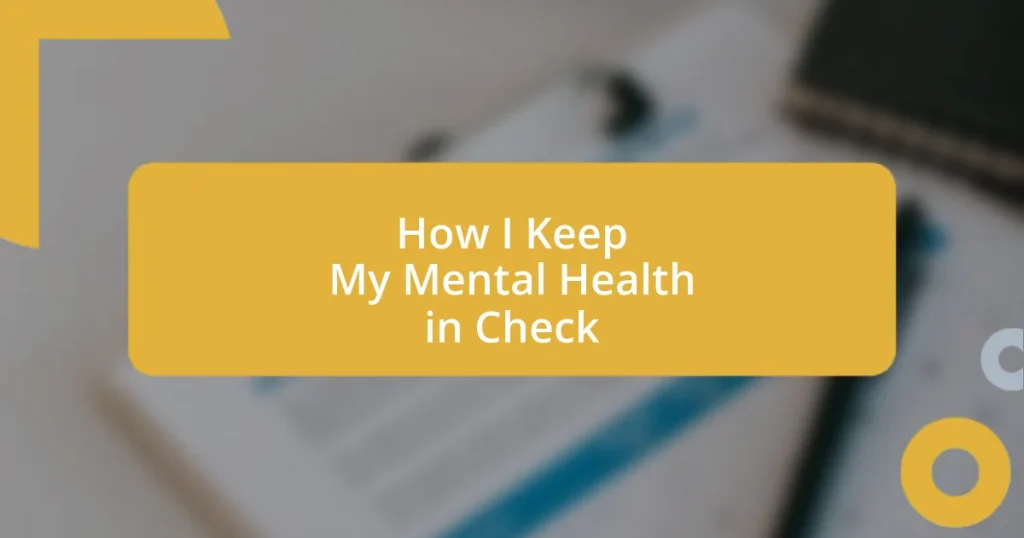Key takeaways:
- Prioritizing mental health enhances mood, productivity, and relationship quality, fostering deeper connections and resilience against stress.
- Implementing daily mindfulness routines, such as meditation and gratitude practices, can significantly improve mental clarity and emotional well-being.
- A strong support system is crucial for mental health; nurturing relationships, recognizing when to seek help, and maintaining consistency in connections are vital for navigating life’s challenges.
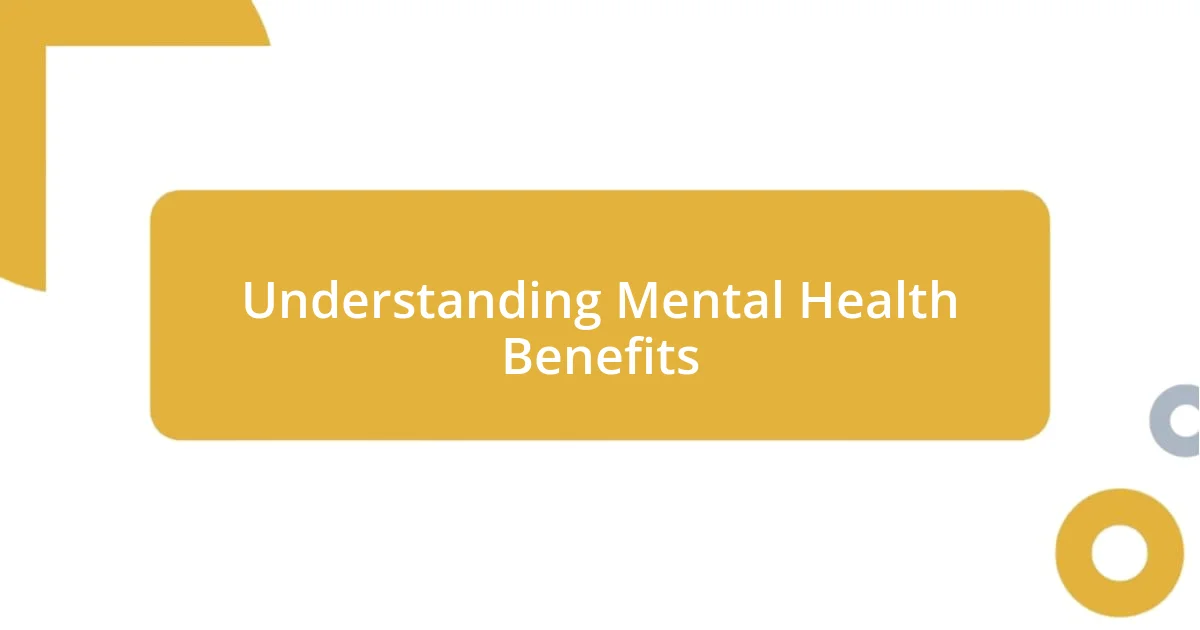
Understanding Mental Health Benefits
Understanding the benefits of mental health really opened my eyes to the power of a healthy mind. For instance, when I started prioritizing my mental well-being, I noticed not only an improvement in my mood but also a significant boost in my productivity. How often do we overlook the connection between our emotional state and our ability to function in daily life?
The role of mental health extends beyond just feeling good; it shapes our relationships and how we interact with the world. I always thought I was just naturally introverted, but as I worked on my mental health, I found that deeper connections with others came more easily. Isn’t it fascinating how nurturing our mental health can transform our ability to form bonds and connect genuinely with those around us?
In my experience, maintaining good mental health also fosters resilience against stress. I remember a particularly challenging work project that used to leave me overwhelmed. But by implementing mindfulness practices, I developed a sense of calm that helped me tackle stress head-on. It’s amazing how those benefits ripple into every area of our lives, right?
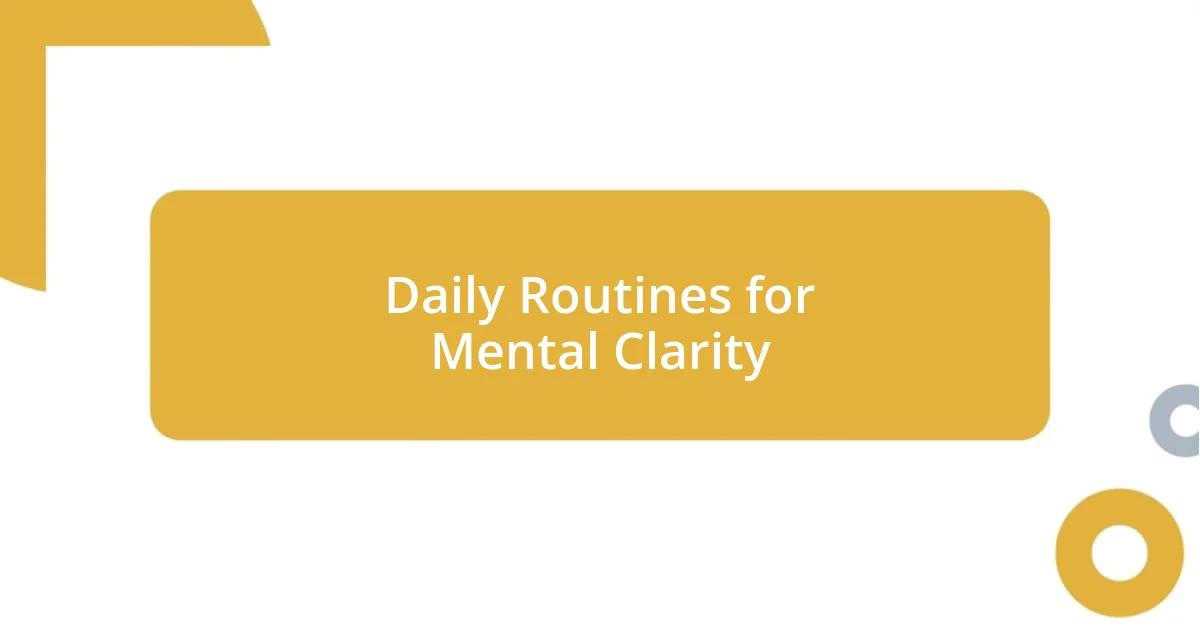
Daily Routines for Mental Clarity
Daily Routines for Mental Clarity
Establishing a consistent morning routine has been transformative for my mental clarity. I start each day with a few minutes of meditation, which allows me to center my thoughts and set intentions. On days when I skip this practice, I can definitely feel the difference in my focus and mood—it’s like starting my day with a fogged-up lens!
In my experience, dedicating time to physical activity is crucial. I often take brisk walks or do yoga for around 30 minutes. The endorphin rush I receive is a natural mood booster, clearing my mind and enhancing my overall well-being. I’ve learned that even a short burst of exercise can shift my perspective on the day ahead—what forms of movement do you enjoy that help you feel more clear-headed?
Another key aspect of my daily routine is limiting screen time, especially during meals. By being more present and mindful, I notice how it helps me truly savor my food and appreciate the moment. Taking this time to disconnect allows me to recharge emotionally and mentally. Have you ever found that moments of quiet can lead to greater insights? For me, they certainly do.
| Routine | Impact on Mental Clarity |
|---|---|
| Meditation | Enhances focus and sets intentions for the day |
| Physical Activity | Boosts mood and relieves stress |
| Limiting Screen Time | Encourages mindfulness and reduces distractions |
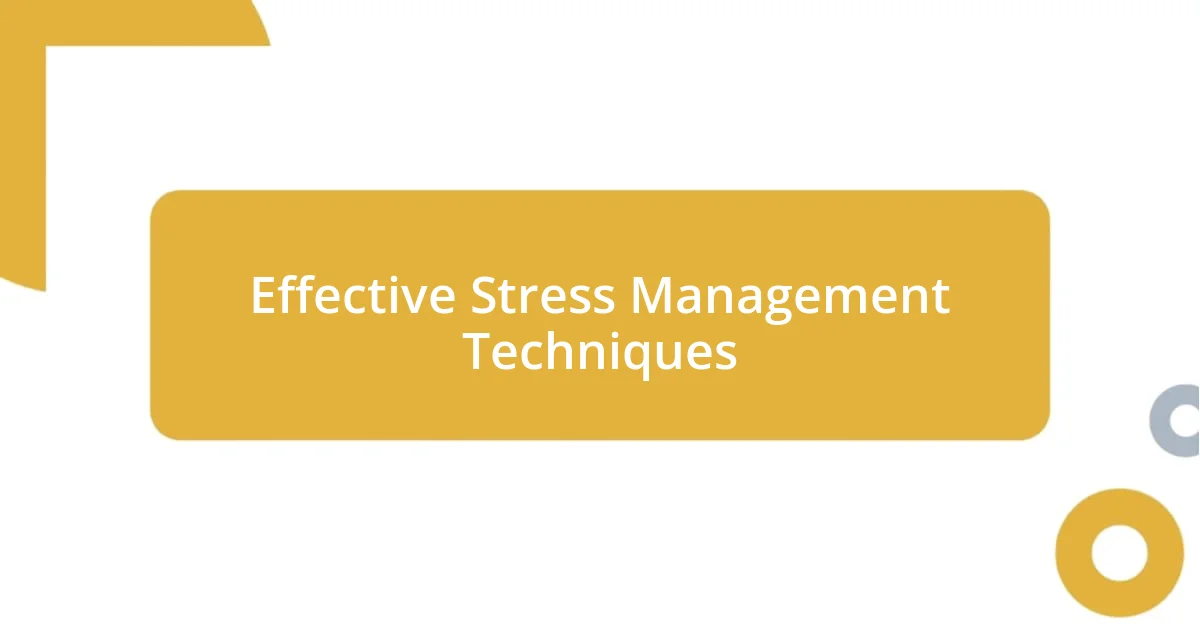
Effective Stress Management Techniques
Effective stress management is vital for maintaining a balanced mental state. One technique I find incredibly useful is deep breathing exercises. When I feel stress creeping in, a few minutes of focused breathing helps to calm my racing mind and lower my heart rate. I remember a particularly tough day at work when I felt overwhelmed by deadlines; stepping away for a quick breathing session made all the difference in helping me regain my focus.
Here’s a list of effective stress management techniques I often use:
- Deep Breathing Exercises: Good for instant calmness and clarity.
- Progressive Muscle Relaxation: Helps release tension in your body.
- Gratitude Journaling: Shifts my focus from stressors to positives in life.
- Nature Walks: Immersing myself in green spaces rejuvenates my spirit.
- Creative Outlets: Drawing or writing can transform stress into something tangible and beautiful.
Another technique that has proven effective for me is setting boundaries. I realized that overcommitting often leads to unnecessary stress. Learning to say no to extra responsibilities was tough initially, but I’ve now embraced it as a form of self-care. It feels liberating to prioritize my time and energy, allowing me to focus on what truly matters to me. Stress management isn’t just about tackling the immediate pressure; it’s about creating an environment where I can thrive without constant overwhelm.
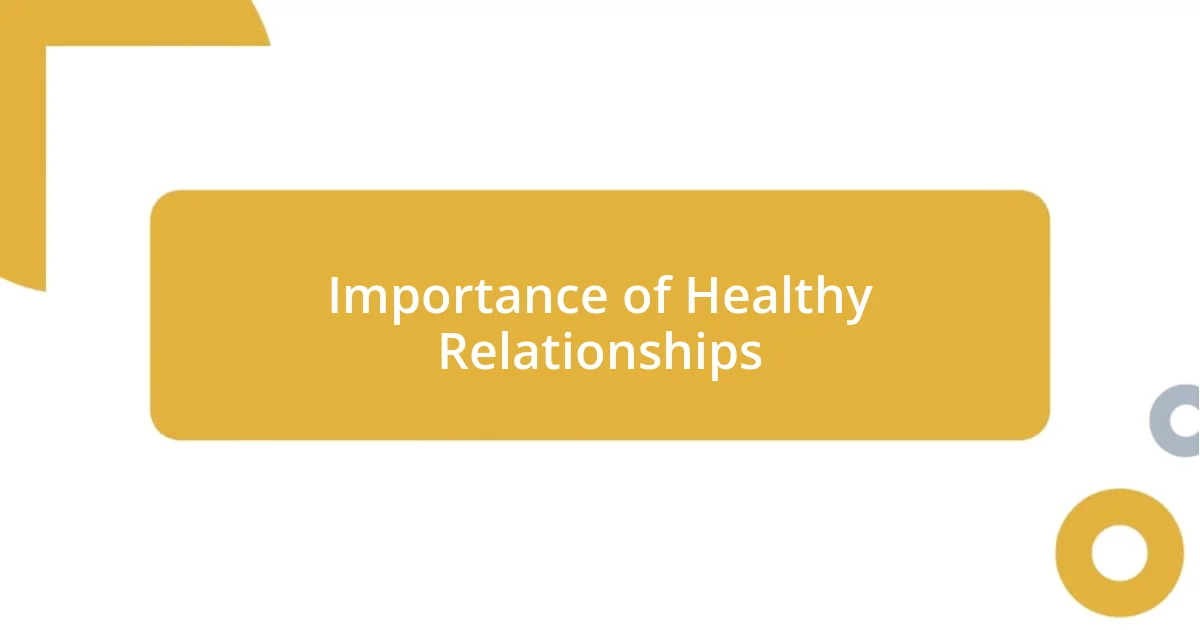
Importance of Healthy Relationships
Healthy relationships play a fundamental role in maintaining my mental health. I’ve found that surrounding myself with supportive friends and family creates a safety net, allowing me to navigate life’s ups and downs with more resilience. Can you recall a time when a friend’s encouragement helped lift your spirits? For me, those moments remind me just how crucial it is to have a solid support system.
Nurturing these connections requires effort and openness. I often make it a point to check in with loved ones regularly, whether it’s a simple text or a coffee catch-up. These little gestures have a ripple effect, deepening our bonds and creating an environment where we can share our feelings without judgment. Have you experienced how just talking things out can lighten your emotional load?
I’ve also observed that healthy relationships foster a sense of belonging. When I engage with people who share similar interests or values, it not only enriches my life but also enhances my self-esteem. There’s a certain comfort in sharing laughs or struggles that makes the journey of life feel less daunting. How about you? Have you found that your friendships provide clarity and help shape your perspective? They certainly do for me.
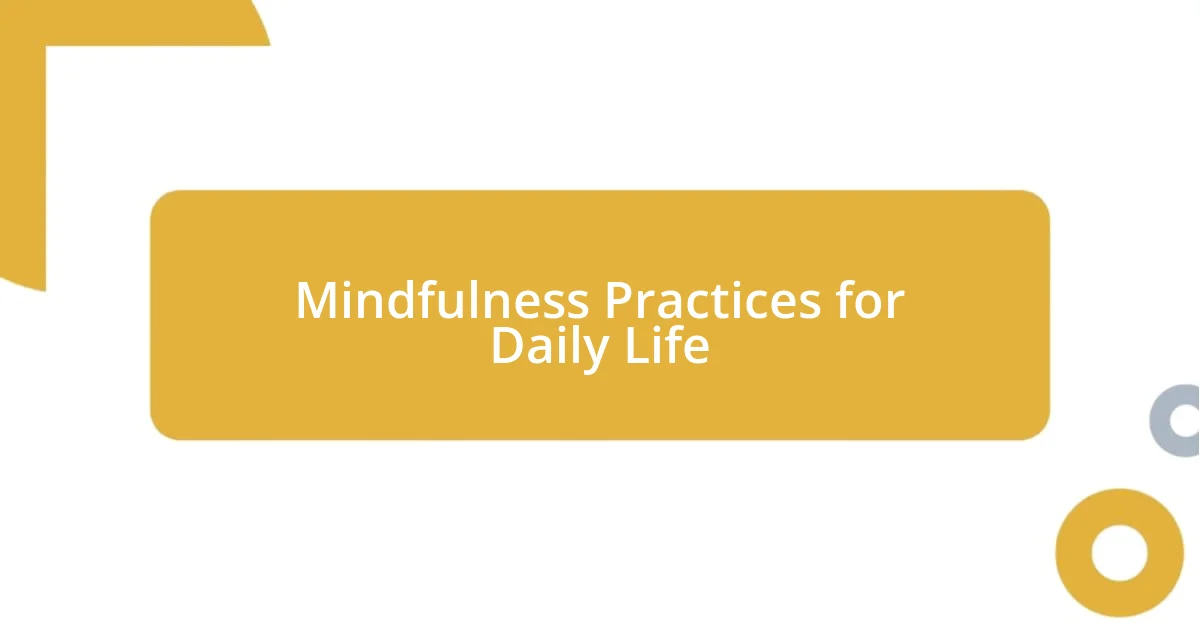
Mindfulness Practices for Daily Life
Mindfulness can weave seamlessly into our daily routines, and one practice that resonates with me is mindful eating. I remember sitting down to a meal one evening, feeling rushed and frazzled after a busy day. This time, instead of scrolling through my phone, I focused on each bite—the textures, flavors, and even the colors on my plate. By doing so, I experienced a deeper connection to my food and a sense of gratitude that lingered long after the meal was over. Have you ever truly savored your food? If not, I urge you to give it a try; it can transform how you experience your meals.
Another daily mindfulness practice I enjoy is taking pauses throughout the day. Whenever I encounter a stressful moment, I take 30 seconds to simply observe my surroundings. Whether it’s the sound of birds outside my window or the light filtering through the trees, these observations ground me. Once, during a particularly hectic workday, I stepped outside and closed my eyes. The warm sun on my face and the rustling leaves reminded me of life beyond the office, helping me regain perspective and calm. Isn’t it fascinating how a little stillness can breathe fresh air into a chaotic day?
Lastly, I find that incorporating gratitude into my mornings sets a positive tone for the day ahead. Each morning, I take a minute to reflect on three things I appreciate about my life—big or small. One day, I was grateful for the warmth of my coffee, the laughter of my niece, and the chance to start afresh. This simple ritual cultivates a mindset focused on positivity and abundance, shifting my perspective right from the start. Have you tried starting your day with gratitude? I promise it can create a ripple effect throughout your day, lighting up even the dullest moments.
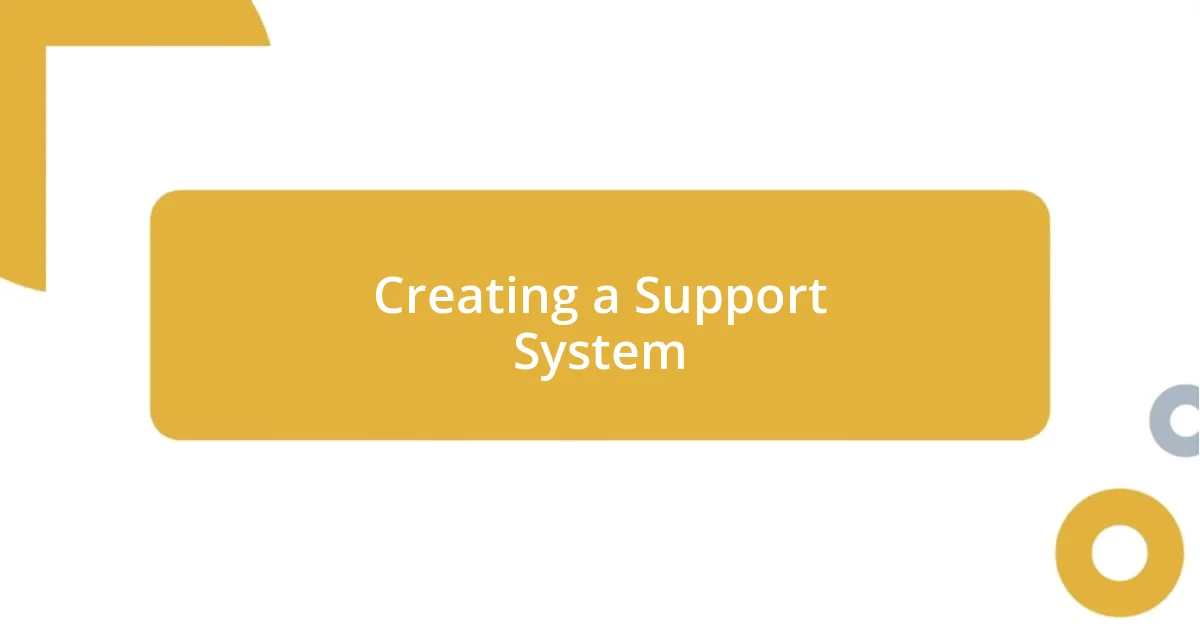
Creating a Support System
Building a support system isn’t just about the people you know; it’s about the quality of those connections. I vividly recall a time when I reached out to a friend after a particularly challenging week. Just sharing my trials made all the difference. Have you ever noticed how simply having someone listen can lighten your burden? It’s in those moments of vulnerability that I feel the real strength of my support network.
Another essential aspect is being proactive rather than reactive. I’ve learned to surround myself with people who uplift me and challenge me to grow. This means saying ‘no’ to relationships that drain my energy and ‘yes’ to those that nourish it. Have you evaluated the people in your life lately? For me, knowing who brings positivity reminds me that I don’t have to navigate life’s challenges alone.
Moreover, consistency is key in maintaining these relationships. I find that scheduling regular catch-ups or simply sending a message to check in cements these bonds. Just the other day, I planned a video call with a friend I hadn’t spoken to in months and was pleasantly surprised by how easily we fell back into our rhythm. Isn’t it empowering to reconnect and remind each other of our shared journey? Those moments affirm my belief that a strong support system is worth the effort.
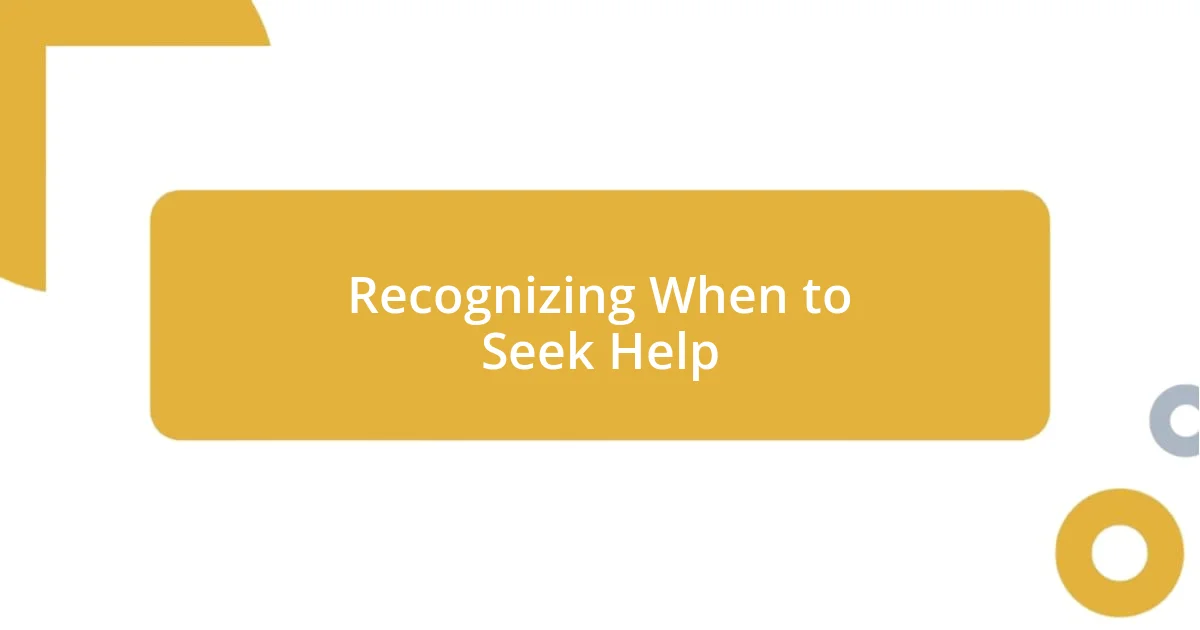
Recognizing When to Seek Help
Recognizing when to seek help can be a delicate yet crucial part of maintaining mental health. I remember a time when I felt persistently overwhelmed by stress, yet I kept convincing myself I could handle it. Eventually, a close friend pointed out the changes in my mood and energy, leading me to realize that my coping mechanisms were wearing thin. Have you ever overlooked your own well-being until someone else brought it to your attention? Sometimes, it takes an outside perspective to truly see what’s going on inside.
It’s not just about the obvious signs of distress, either. I’ve learned that recognizing subtle shifts in my behavior—like withdrawing from social activities or losing interest in hobbies I once loved—can be just as telling. These moments serve as gentle nudges, reminding me to take a step back and reassess my mental health. Have you noticed similar patterns in your life? Trusting those instincts is essential; they can signal that it might be time to reach out for professional help or talk to a trusted friend.
Moreover, I find it helpful to monitor how my physical health relates to my mental well-being. During one stressful period, I noticed an increase in tension headaches and fatigue, both of which were indicators of my mental state. It gets me thinking—how often do we connect the dots between our bodies and minds? I’ve come to appreciate that signs like these are not just physical complaints; they’re messages my body sends to let me know it’s time to seek support and prioritize my mental health.










